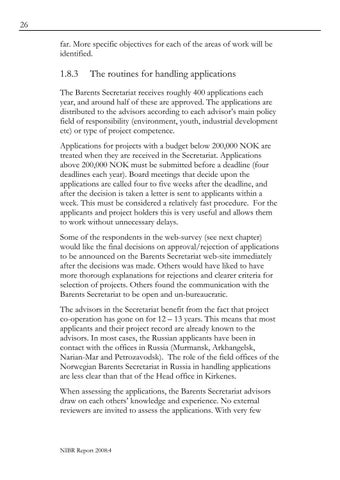26 far. More specific objectives for each of the areas of work will be identified.
1.8.3
The routines for handling applications
The Barents Secretariat receives roughly 400 applications each year, and around half of these are approved. The applications are distributed to the advisors according to each advisor’s main policy field of responsibility (environment, youth, industrial development etc) or type of project competence. Applications for projects with a budget below 200,000 NOK are treated when they are received in the Secretariat. Applications above 200,000 NOK must be submitted before a deadline (four deadlines each year). Board meetings that decide upon the applications are called four to five weeks after the deadline, and after the decision is taken a letter is sent to applicants within a week. This must be considered a relatively fast procedure. For the applicants and project holders this is very useful and allows them to work without unnecessary delays. Some of the respondents in the web-survey (see next chapter) would like the final decisions on approval/rejection of applications to be announced on the Barents Secretariat web-site immediately after the decisions was made. Others would have liked to have more thorough explanations for rejections and clearer criteria for selection of projects. Others found the communication with the Barents Secretariat to be open and un-bureaucratic. The advisors in the Secretariat benefit from the fact that project co-operation has gone on for 12 – 13 years. This means that most applicants and their project record are already known to the advisors. In most cases, the Russian applicants have been in contact with the offices in Russia (Murmansk, Arkhangelsk, Narian-Mar and Petrozavodsk). The role of the field offices of the Norwegian Barents Secretariat in Russia in handling applications are less clear than that of the Head office in Kirkenes. When assessing the applications, the Barents Secretariat advisors draw on each others’ knowledge and experience. No external reviewers are invited to assess the applications. With very few
NIBR Report 2008:4
